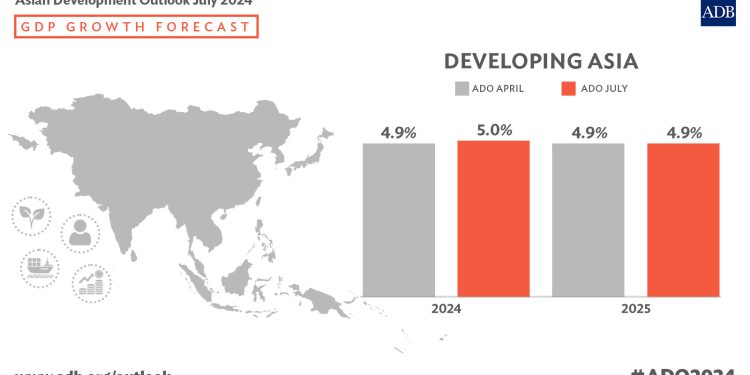The Asian Development Bank (ADB), in response to a resilient domestic demand and rising regional exports, has slightly increased its economic growth projection for developing Asia this year from 4.9% to 5.0%. The growth outlook for the next year remains at 4.9%.
According to the latest edition, released today, of the Asian Development Outlook (ADO), inflation is expected to slow this year to 2.9% due to lower global food prices as well as the lingering effect of higher interest rates.
Exports are regaining momentum after a post-pandemic rebound that was mainly driven by domestic demand. This is helping to propel the economic growth of the region. Exports from Asia are being boosted by a strong global demand for electronic products, especially semiconductors for high-tech and artificial intelligence applications.
Albert Park, Chief Economist at ADB, said that most of Asia and the Pacific are experiencing faster economic growth than the second half of the year. “The fundamentals of the region remain strong, but policymakers still need to be aware of a number risks that could impact the outlook. These include uncertainty over election results in major economies, interest rate decisions, and geopolitical tensions.”
While inflation in the region is easing to pre-pandemic levels, there are still high price pressures in some economies. Food inflation remains high in South Asia and Southeast Asia as well as the Pacific. This is partly due to adverse weather conditions and restrictions on food exports in some economies.
The forecast for growth in the People’s Republic of China, the largest economy in the region, remains at 4.8%. A continued recovery in services consumption and stronger-than-expected exports and industrial activity are supporting the expansion, even as the PRC’s struggling property sector has yet to stabilize. In May, the government introduced new policy measures to support the real estate market.
India, the fastest-growing economy in the region, will also remain unchanged at 7.0% by fiscal year 2024. India’s industrial sector will grow strongly, driven by manufacturing as well as strong demand in construction. The agriculture sector is expected to recover due to forecasts of an above-normal rainy season, while investment demand, led by government investment, remains strong.
The growth forecast for Southeast Asia is kept at 4.6%, despite a solid improvement in both the domestic and external demand. This year’s outlook for the Caucasus and Central Asia is raised to 4.5% from a previous projection of 4.3%, driven in part by stronger-than-expected growth in Azerbaijan and the Kyrgyz Republic. In the Pacific, growth is forecast to be 3.3% in 2024, driven by tourism, infrastructure spending and a revival of mining activity in Papua New Guinea.
ADB is committed in its efforts to eradicate poverty and achieve a prosperous, inclusive and resilient Asia and Pacific. It was founded in 1966 and is owned by 68 member countries, 49 of which are from the region.
Read More @ georgiatoday.ge













